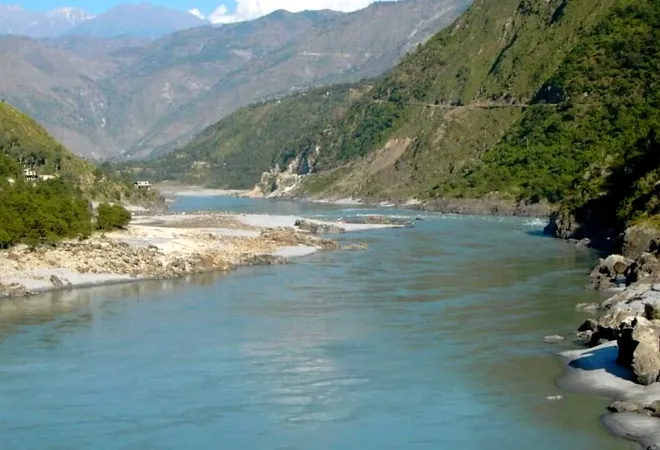-
CENTRES
Progammes & Centres
Location
The politicisation of the water issues of the Indus system has overshadowed the much-required integrated basin governance

The long-standing Indus Waters Treaty (IWT), a first-of-its-kind arrangement that was brokered by the World Bank between India and Pakistan for sharing the waters of the Indus system, made it the headlines last month. As India issued a notification to Pakistan for modification to the treaty, speculations are rife that the treaty is showing signs of inefficacy and that cracks are visible on the sole bridge between the two nuclear neighbours with one of the most heavily armed borders in the world. On the other hand, for many in the hydro-diplomacy community, the IWT and its Permanent Indus Commission remain a stellar example to cite for asserting that nations can cooperate for managing their shared rivers even with mutual mistrust and hostile political relations.
The present development
India issued a notice to Pakistan on 25th January 2023 through its commissioner to the bilateral Permanent Indus Commission suggesting that Pakistan should enter intergovernmental negotiations within 90 days to rectify the material breach of the treaty under Article 12(3) of IWT. India defended its move by stating that it was adhering to the provision under the treaty for a graded mechanism for handling an issue of concern as it interpreted it. Therefore, it asked for a government-to-government negotiation before accepting the involvement of a neutral expert and finally taking it to a court of arbitration.
India defended its move by stating that it was adhering to the provision under the treaty for a graded mechanism for handling an issue of concern as it interpreted it.
This is of consequence since Pakistan has always preferred the route of arbitration rather than a graded approach in the past with the involvement of a neutral expert before submitting to arbitration. In India, the perceived root cause for this present move is that Pakistan initially sought a neutral expert to examine the technical objections that it had raised on India’s Kishanganga and Ratle Hydropower projects but then backtracked and asked for adjudication through a court of arbitration. Despite repeated efforts by India to negotiate at consecutive meetings of the Permanent Indus Commission, Pakistan refused to budge.
The World Bank, as a signatory to the treaty, has maintained ambivalence and has yielded to both demands by appointing a neutral expert and a chairman for the court of arbitration. This has created a particularly confounding situation due to the initiation of two mutually-exclusive tracks for discussing and resolving the thorny issues. The Bank also recognised the practical and legal risks that this duality poses. However, it also stressed that inaction on its part even when the two parties had failed to reach an acceptable and amicable solution on their own, would only jeopardise the treaty. Indian strategic experts have called Pakistan’s repeated stance of seeking arbitration as prejudicial and pernicious while accusing the World Bank that it has allowed Pakistan to run riot in the last few years.
Mistrust and mismanagement
In the last two decades, both governments have raked up their concerns with the IWT, often coupling the Indus waters with national security and sovereignty with concerns emerging from the highest levels of governments at times. Apart from the political conjectures emerging from a tense political relations between the two nations, Pakistani officials and ministers on their part have issued statements accusing India of creating water woes in Pakistan by allowing sudden releases of water without prior notification as was the case in 2019. This is even after the long-existing counterview that Pakistan has done woefully little to manage situations of flooding and finds it tactical to blame India for it. For that case, India’s position was said to be that such releases are “routine exercises” during monsoon and that the amount released did not mandate disclosure. Pakistan has also been apprehensive about two projects by India – the Baglihar and Kishanganga Hydroelectric Project (HEP), accusing India of acquiring the power to affect the timing and flow of water into Pakistan on rivers that belong to it under the provisions of IWT.
Indian strategic experts have called Pakistan’s repeated stance of seeking arbitration as prejudicial and pernicious while accusing the World Bank that it has allowed Pakistan to run riot in the last few years.
Misaligned priorities
The politicisation of the IWT is systematic and has been occurring in a synchronised way, especially in Pakistan due to their misplaced developmental priorities. The massive concern here is that it has undone what could be achieved through decades of effective hydro-diplomacy within the aegis of the Permanent Indus Commission. The politicisation of the issues has been creating a vicious environment of mutual distrust that permeates into public life in both countries and adds to the existing acrimony. Pundits in India have started explicitly advocating India to use its ‘Indus leverage’ over Pakistan, which again is a problem from both hydrological and hydropolitical perspectives.
All this has increasingly made the interactions through the commission a redundant and futile exercise and its ramifications are only beginning to appear. For inspiration on how hydrodiplomacy can work, one may look at the settlement of the dispute over the Salal HEP in the previous century. The late Harvard professor John Briscoe, also a celebrated World Bank water expert and a keen, long-term observer of the evolving hydropolitics in the subcontinent, had foreseen these developments. In 2010, he remarked that it requires far-sighted political leadership to build a bridge over the troubled waters of the Indus and later strongly advocated that both countries should explore joint benefits to take IWT in a new, positive direction.
The politicisation of the issues has been creating a vicious environment of mutual distrust that permeates into public life in both countries and adds to the existing acrimony.
An issue as complex as those involving transboundary rivers and the appraisal of the institutional framework for their governance should be best left to those who understand the intricacies that such systems entail. What, therefore, is floating all across the spaces are nothing more than mere conjectures and speculations currently.
Lack of ecosystems approach
On the whole, the lack of trust between nations has marred the hydropolitics of the Indus. A 2018 volume by Enamul Chowdhury and Shafikul Islam identify three enabling conditions that underlie any successful transboundary water negotiation process. These are:
Unfortunately, even if there is partial recognition of the first condition, the other two conditions are missing in the present “Indus game”. At the very outset, it needs to be remembered that the World Bank interventions in 1960 made these enabling conditions work, thereby, resulting in a successful IWT for a long time.
However, the newer challenges of water governance are emerging. Water cannot be looked at as a stock of resource to be stored for human convenience, and released as per human will. Today, whether it is in the Ganges or in the Indus delta regions, there is hardly any acknowledgement that upstream constructions and climate change are wreaking havoc on delta livelihoods. Pakistan is so embroiled in the politics of water that they have become oblivious that they are losing a living heritage, the Palla fish (which is also available in the Bay-of-Bengal and known as Hilsha or Ilish in Bengal and Bangladesh). The lack of flow in the delta regions (including Keti Bunder) caused by climate change and dams upstream has led to a paucity of adequate draft in the Indus for the famous Palla fish to swim upstream for spawning. The decline in catch is affecting the livelihoods of the fishing community.
The lack of flow in the delta regions (including Keti Bunder) caused by climate change and dams upstream has led to a paucity of adequate draft in the Indus for the famous Palla fish to swim upstream for spawning.
Further, it needs to be understood that the share of flow from glacial melt for the Indus is the highest among all single glaciated river basins worldwide with certain estimates placing the contribution to around 40 percent of runoff. Moreover, higher glacial melt due to global warming around the headwaters in the Himalayas is slated to increase flow in the short run but will be a threat to water security in the long run due to scarcities. Therefore, all these bigger climatic threats and the threats created by the dam structures that can arrest the sediments and can cause upstream floods should be of bigger concern than mere politicisation of the water issues.
The perceived ‘water scarcity’ in Pakistan and its concomitant insecurity as a downstream riparian over India’s action could just be a case of years of gross water mismanagement and neglect within their own boundaries. The priority should have been settling disputes amicably by drawing strength and confidence from the past and preparing for an uncertain precipitation regime of the future due to climate change. This should be done while taking along all technological and scientific imperatives that have emerged since the treaty was signed such as the concept of environmental flows, sediment management, Integrated Water Resources Management (IWRM), and others. Unfortunately, the concern of a much-needed integrated basin governance approach for the Indus has got overshadowed by politics of mistrust and hatred.
The views expressed above belong to the author(s). ORF research and analyses now available on Telegram! Click here to access our curated content — blogs, longforms and interviews.

Dr Nilanjan Ghosh is Vice President – Development Studies at the Observer Research Foundation (ORF) in India, and is also in charge of the Foundation’s ...
Read More +
Sayanangshu Modak was a Junior Fellow at ORFs Kolkata centre. He works on the broad themes of transboundary water governance hydro-diplomacy and flood-risk management.
Read More +